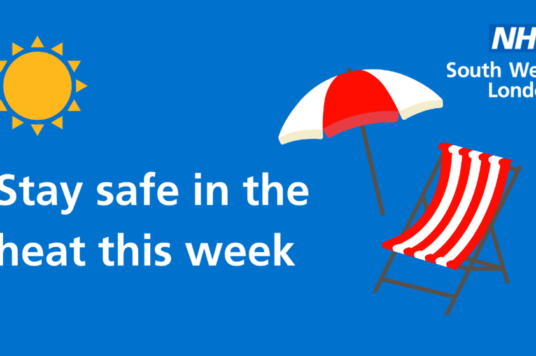Second summer scorcher set for south London
Doctors and nurses are giving advice to local communities to stay safe in the hot weather as temperatures rise once again for a second summer scorcher this week.
As temperatures are set to reach 36 degrees, the UK Health Security Agency has once again declared a heat health alert as it says vulnerable people – including elderly people, those living alone and children – are most at risk during the hot weather.
Advice from frontline clinical teams at St George’s, Epsom and St Helier University Hospitals and Health Group includes drinking plenty of water, staying out of the sun at the hottest part of the day and wearing sun cream and a hat when out and about.
It’s not just how to keep safe in the sun though, the Hospital Group is also issuing guidance as to when and how to access health care, as the hot weather can cause an increase in demand for their services when other services, including pharmacies, are able to see people more quickly for minor illnesses and injuries.
Arlene Wellman, Chief Nursing Officer at St George’s, Epsom and St Helier University Hospitals and Health Group, said:
“As the temperature rises, it’s only natural to want to enjoy the sunshine, but please do this sensibly by drinking plenty of water to stay hydrated, wearing sun cream to avoid burns and staying out of the sun at the hottest parts of the day to avoid heat stroke.
“If you need medical help, please call NHS 111 first or visit your local pharmacy and they will advise and signpost you as needed. Of course, we are always here if you need us for serious illness or injury such as severe chest pain, stroke, a broken bone or if you are bleeding.”
Last month, when temperatures exceeded 40 degrees, the Hospital Group saw an influx of heat-related conditions to their Emergency Departments including dehydration, heat stroke, allergies, asthma, insect bites, stings and more.
Some of these conditions can be easily treated with over-the-counter medication via pharmacies and the Hospital Group advises that those with allergic conditions, including hay fever and asthma, ensure they have adequate supplies and use their preventer medication and have rescue treatments on hand if needed to reduce the risk of requiring urgent medical help.
The Hospital Group is also posting top tips on how to stay safe in the heat via their social media channels as well as advice to patients to bring a water bottle to hospital appointments to stay hydrated and encouraging local communities to look out for one another but particularly those who are more vulnerable and may need more support during the hot weather.
GP surgeries, including out of hours services, and pharmacies are open as usual as is the 24/7 Mental Health Crisis Line – 0800 028 8000 – which is run by South West London and St George’s Mental Health NHS Trust. The crisis line team are trained NHS mental health professionals who offer emotional support and advice to people of all ages – children, young people, and adults.
Notes to editors
About St George’s, Epsom and St Helier University Hospitals and Health Group
St George’s University Hospitals NHS Foundation Trust is the largest healthcare provider and major teaching hospital for south west London, Surrey and beyond – and one of the largest healthcare providers in the UK – serving a population of 3.5 million.
Its main site, St George’s Hospital – one of the country’s principal teaching hospitals – is shared with St George’s, University of London, which trains medical students and carries out advanced medical research.
St George’s is one of 11 adult and children major trauma centres in the UK, one of eight hyper acute stroke units and one of the biggest and busiest of the eight heart attack centres in London.
It is also an accredited centre of excellence for trauma, neurology, cardiology, cancer and blood pressure services and is the national centre for family HIV care and bone marrow transplantation for non-cancer diseases.
St George’s children’s services are rated outstanding by the CQC.


